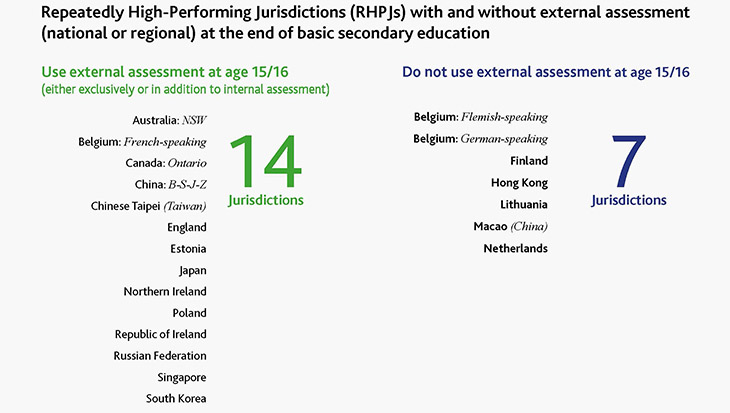- "No other country in Europe tests at 16." (1)
- "The UK is the only European country to have high-stakes testing at 16." (2)
- "We have to face the uncomfortable truth that - internationally - we're the oddballs." (3)
It is often asserted that England is in some way an outlier in having external assessment at the end of basic secondary education. But is this true? We’ve undertaken a comprehensive study of Repeatedly High Performing Jurisdictions around the world and found that those that don’t assess externally at the end of basic secondary education are the real minority in this set of jurisdictions.
Our Director of Research Tim Oates CBE first commissioned research in this area as early as 2014. We subsequently published our preliminary thoughts a year later in a paper called Are claims that the GCSE is a white elephant red herrings?
A lot of water has gone under the bridge since then however, so we’ve updated this research to reflect various latest developments in education, not least the current league table of top education systems (Repeatedly High Performing Jurisdictions or RHPJs) around the world. We looked at the assessment approaches used at the end of basic secondary education in RHPJs. Could it be true that the UK is an outlier?
What did we find?
The answers are revealing. In fact, high performers that don’t use any high stakes assessments at all at the end of basic secondary education are the true outliers, and those that only assess internally are a clear minority in this set of jurisdictions. Here's what we found:
- Two thirds of RHPJs use external assessment at the end of basic secondary education, either exclusively or in addition to internal assessment. In addition to England and Northern Ireland, the list of external assessment users includes four other European RHPJs. These are the Republic of Ireland, Poland, Estonia, and Belgium’s French-speaking community. The number of European RHPJs that do not use external assessment is very similar. Overall, there is no striking geographical divide between the RHPJs that use external assessment and those that do not.
- In many RHPJs, external assessment plays a critical role in determining students’ directions in upper secondary education – just as in England, Wales and Northern Ireland where GCSEs will help students to choose which A Level subjects to study, or maybe whether to take a vocational route.
- In many RHPJs, external assessment also plays a critical role in providing students with formal recognition of their achievements in subjects that they might never study again. This is just like in England, Wales and Northern Ireland. A student who chooses to specialise in the arts at A Level nonetheless has a solid grounding and qualifications in maths and science, courtesy of the GCSEs they took.
- External assessment at the end of basic secondary is rooted soundly in meritocratic principles. In England this is a subject close to our hearts as it goes back to the very reason Cambridge Assessment was established.

So far, so interesting, but it’s worth mentioning some other key findings. You often come across the suggestion that you just need to abolish GCSEs to bring about a marked improvement in England’s educational performance. But in fact we found no evidence to suggest that abandoning external assessment at the end of basic secondary education, or not adopting it in the first place, was associated with higher student performances at system level.
We also hear a lot of voices saying: “It’s not GCSEs I’ve got a problem with. It’s how they’re used…” In other words, GCSEs are a good thing, but their use in accountability measures renders them in some sense toxic. This too demanded closer inspection. In fact we found that using assessment at the end of basic secondary education for the additional purpose of accountability also in not unique to England. Repeat high performers such as Estonia and Shanghai also do so.
What to conclude from this latest study?
So, what to conclude from this latest study? Well firstly, do take a look at the whole report because this blog is just a snapshot of the key findings.
One thing we can say is that the findings chime with studies on the need to appreciate the complexity and context of national education systems. We have produced a set of Outline Principles for the Future of Education that those who are interested in contributing to the debate can consider. In the assessment space, we believe:
- Dependable assessment is vital for social justice, learning support and equitable progression.
- Clear standards are important for equity, accessibility and progression for all learners.
No single innovation will secure a perfect education system and there is no reason to believe that internal assessment is a panacea. Instead, we suggest that policy-makers focus on maximising coherence across elements such as curriculum, pedagogy and assessment – as this is what is associated more strongly with successful outcomes.
___________________
References: